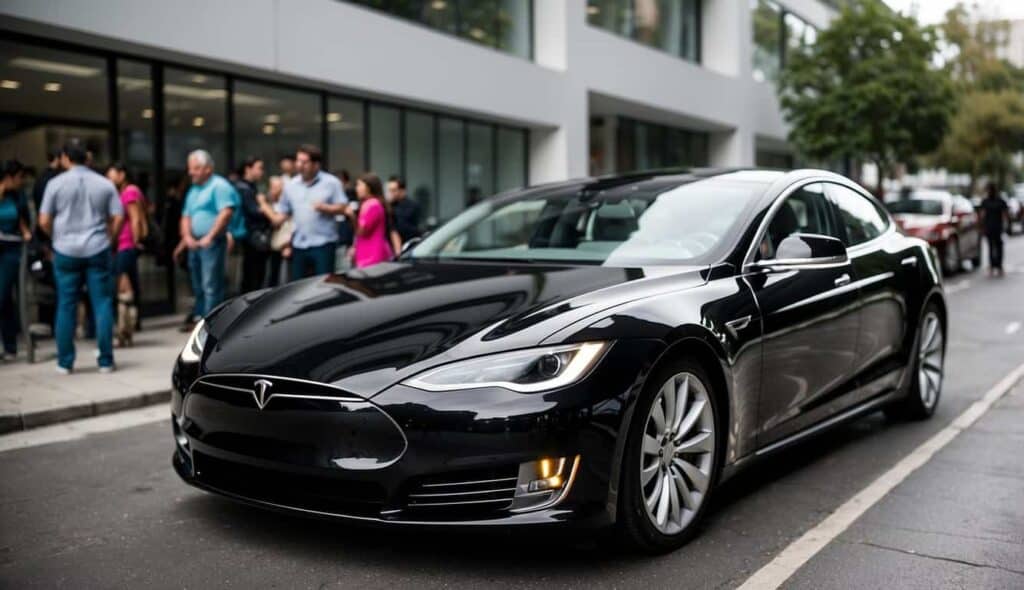Many Tesla owners are surprised by the high registration fees when they receive their renewal notice from the DMV. In California, the registration fee for Teslas can be as much as $700 or more annually. This significant cost is due to several factors, including the vehicle’s high market value and additional state-specific fees for electric vehicles.
In states like California, registration fees are partly based on a car’s value. With Teslas being high-end vehicles, their registration costs are naturally higher. Moreover, some states impose extra fees on electric vehicles to offset the lost revenue from gas taxes. For instance, a new plug-in vehicle in California faces a one-time registration fee of $100, followed by annual fees up to $175 based on the car’s value.
The perception of high registration costs can also be attributed to policy changes to generate revenue for road maintenance and infrastructure. This has affected luxury vehicles like Teslas and other high-value cars.
Understanding Vehicle Registration
Vehicle registration is essential for identifying who owns a car and ensuring that owners contribute to road maintenance and other essential services. This section will cover the purpose of registration fees and the components that make up these costs.
Purpose of Registration Fees
Registration fees serve multiple purposes. They help state governments generate revenue to maintain and improve roads, bridges, and other infrastructure. These fees are collected by the DMV and vary by state.
Electric vehicles like Teslas often have higher fees due to their advanced technology and environmental benefits. States may charge extra fees for electric cars to offset the loss of fuel tax revenue. The goal is to ensure that all drivers contribute fairly to road upkeep.
Components of Registration Costs
Several factors influence the total cost of vehicle registration. A standard registration fee typically covers basic administrative costs.
Additional fees may include a license fee, which varies based on the vehicle’s value and type. Electric vehicles sometimes incur extra charges to compensate for lower fuel tax contributions.
Some states also impose fees based on the vehicle’s weight, emissions, and market value. Special fees for luxury or high-tech vehicles add to the total. For example, Tesla owners in California may face fees that combine several of these elements.
Understanding these components can help vehicle owners anticipate and manage their registration expenses more effectively.

Tesla-Specific Registration Factors
Tesla registration costs are influenced by several unique factors, such as the electric vehicle premium, advanced technology, and specifics related to different models, like the Model 3.
Electric Vehicle Premium
Due to their classification, electric vehicles, including Teslas, often have higher registration fees. States like California impose additional fees to offset the lack of gasoline taxes that typically fund road maintenance.
For Tesla owners, this premium helps balance the lost revenue from fuel taxes, which are essential for infrastructure upkeep.
In addition, the initial cost of electric vehicles tends to be higher than that of traditional cars. This higher purchase price increases the registration fees, which are often calculated based on the vehicle’s value. Owners should be aware that driving an electric vehicle entails these additional costs.
Technology and Innovation Costs
Tesla vehicles are packed with cutting-edge technology, such as advanced autopilot features, long-range batteries, and frequent software updates. These technological advancements contribute to the higher upfront costs of the vehicles, which in turn lead to increased registration fees.
Moreover, the complexity and sophistication of Tesla’s technology require specialized parts and maintenance. This indirectly impacts registration costs because the state’s fee structure considers the vehicle’s overall value and upkeep. Higher innovation means higher initial and ongoing costs captured in registration fees.
Model 3 Specifics
One of Tesla’s most popular models, the Model 3, still carries significant registration fees in states like California. The high demand and valuation of this model contribute to its registration costs. Despite being one of Tesla’s more affordable options, the Model 3’s registration can be expensive due to its premium materials and advanced features.
Additionally, given its electric nature, the Model 3 is subject to the same electric vehicle premiums applied to other Tesla models. Owners might find the registration costs substantial, especially with other state-specific charges.
State-Based Registration Variations
Registration fees for Tesla vehicles can vary greatly depending on the state of registration. Each state has its own policies, fee structures, and additional taxes that can impact the overall cost.
Differences in State Policies
Various states in the U.S. have different policies for registering electric vehicles (EVs) like Tesla. For example, California charges an annual fee of up to $175 based on the vehicle’s value, while Georgia has a one-time registration fee and a lower annual fee.
Washington state, for instance, recently increased its EV registration fees, making it more expensive for Tesla owners. Colorado, on the other hand, offers simpler registration processes but still imposes certain additional fees for EVs.
These policy differences are crucial for Tesla owners to understand, as they can significantly affect annual costs. Generally, states with more stringent environmental standards tend to have higher registration fees for EVs.
State-by-State Fee Comparison
Here’s a brief comparison of Tesla registration fees in different states:
| State | Annual Fee for EVs | Additional Fees |
|---|---|---|
| CA | Up to $175 | Property, Use Taxes |
| GA | $200 | None |
| WA | $150 | Road Usage Fees |
| CO | $50-$100 | Regional Charges |
| TX | $200 | Standard EV Fees |
As illustrated, California and Texas have some of the highest annual fees. In contrast, Colorado offers relatively lower costs, making it a more affordable option for Tesla registration.
Impact of Local Taxes
Local taxes can also add to the cost of Tesla registration. Property taxes in states like California can be significant, often based on the vehicle’s value. Additionally, use taxes, which are applied during registration, can further increase costs.
In Colorado, local DMV offices may impose regional charges that can add to the registration fee. These local taxes vary widely, so Tesla owners need to research specific costs in their area.
Although Georgia has no additional property or use taxes, other states may impose them, impacting the total cost of ownership. Understanding these local tax implications is critical for accurately budgeting for Tesla registration fees.

Additional Costs Affecting Registration
Several additional costs can significantly affect the total cost of registering a Tesla. The sales tax implications and the annual registration renewal fees are two critical factors.
Sales Tax Implications
Sales tax is a major part of Tesla’s registration cost. The sales tax rate can vary widely depending on the state and local jurisdictions. In states like California, the sales tax rate is relatively high, which can significantly increase the registration cost.
For instance, California’s base state sales tax rate is currently 7.25%. Local counties can impose additional sales taxes, pushing the rate up to around 10%. These taxes are calculated based on the vehicle’s purchase price, which can be substantial given the higher prices of Tesla models.
Example Calculation:
- Base price of Tesla: $50,000
- Sales tax rate: 9.5%
- Total sales tax: $4,750
Annual Registration Renewal Fees
In addition to the initial registration fees, Tesla owners must also pay annual registration renewal fees. These fees can be influenced by the vehicle’s value, age, and type. Some states impose additional fees for electric vehicles like Teslas to offset lost gasoline tax revenue.
For example, California charges an annual fee as high as $175 for electric vehicles based on their value. This fee is imposed in addition to other standard registration fees. The purpose of these additional fees is to compensate for the lack of fuel taxes paid by electric vehicle owners.
Annual Fees Example:
- Standard registration fee: $60
- Electric vehicle fee: $175
- Total annual fee: $235
These additional costs, when combined, can make the total amount for registering a Tesla quite substantial.
Economic and Environmental Incentives
The high cost of Tesla registration can be influenced by both economic and environmental factors, including the differences between gasoline taxes and electric car fees, as well as various government incentives aimed at promoting electric vehicle (EV) adoption.
Gasoline Tax Vs. Electric Car Fees
Gasoline taxes are traditionally used to fund road maintenance and infrastructure. Drivers of internal combustion engine vehicles contribute to these funds every time they fill up at the pump. These taxes also discourage excessive fuel consumption, thereby reducing tailpipe emissions.
Electric car drivers, on the other hand, do not pay gasoline taxes. To offset this, many states have implemented additional registration fees for EVs, such as Tesla. These fees aim to ensure that all drivers contribute to road maintenance. However, the higher fees can make EV ownership more expensive despite the vehicles’ lower environmental impact.
Government Incentives for EVs
Governments offer various incentives to encourage the shift to environmentally friendly vehicles. These include tax credits, rebates, and grants for purchasing EVs. For example, buyers might receive a significant tax credit when they purchase a new Tesla. This aims to reduce the initial financial burden and promote wider adoption of EVs.
Non-financial incentives include access to carpool lanes, free parking in certain areas, and reduced toll fees. These benefits help offset the high initial cost of electric car registration. The goal is to make owning a car like a Tesla not only environmentally beneficial but also economically viable despite higher upfront costs.
By understanding these economic and environmental incentives, potential Tesla owners can better navigate the financial landscape of EV ownership.
Comparative Analysis with Gasoline-Powered Vehicles
Electric cars, such as Tesla, have higher registration fees than gasoline vehicles. Understanding the differences in registration costs helps owners weigh the benefits and drawbacks of each type of vehicle.

Cost-Benefit Overview for Tesla Owners
Tesla owners face higher registration fees due to various factors. These include additional fees for electric vehicles and luxury car classifications. Tesla’s advanced technology and environmental benefits also contribute to the costs.
Despite higher registration fees, Tesla owners often save money on fuel and maintenance over time. Electric vehicles are cheaper to run per mile than gasoline cars, as they use electricity instead of gasoline, which is usually less expensive. Maintenance costs are also lower since electric engines have fewer moving parts.
Additionally, Tesla vehicles may qualify for tax incentives and rebates promoting green energy. These financial benefits can offset some initial registration costs, making Teslas a cost-effective choice in the long run.
Gasoline Vehicle Registration Fees
Gasoline-powered vehicles generally have lower registration fees than Teslas and other electric cars. Registration fees for gasoline vehicles depend on factors like the car’s age, weight, and market value.
In many states, drivers of gasoline vehicles also pay fuel taxes, which are included in the price per gallon of gasoline. For instance, a driver of a standard gasoline sedan may pay around $132 annually in gas taxes in states like Ohio.
While initial registration fees are typically lower for gasoline cars, ongoing costs, such as fuel and maintenance, can add up over time. These costs can make gasoline vehicles more expensive to own in the long term than electric cars like Teslas.
Legal and Lobbying Influences
Tesla’s registration fees in California are influenced by both lobbying efforts and state legislative actions. Lobbying efforts and spending aim to influence policies regarding electric vehicles, while state legislation sets the fee structures and regulations.
Role of Lobbying in Fee Legislation
Several electric vehicle companies, including Tesla, invest heavily in lobbying. In 2024, Tesla has spent over $280,000 on federal lobbying. These expenditures aim to shape legislation and regulations that might impact the costs associated with electric vehicles, including registration fees.
Lobbying efforts target various lawmakers and regulatory bodies. The goal is to influence policies that favor electric vehicles, such as incentives and reduced fees. However, despite this spending, registration fees for electric vehicles in California remain high, suggesting challenges in fully swaying legislative outcomes.
State Legislative Actions
California has specific regulations for electric vehicle registration fees. Starting in 2023, there is a one-time upfront registration fee of $100 for newer model plug-in vehicles, followed by an annual fee up to $175 based on the vehicle’s value.
These fees are part of broader state efforts to fund infrastructure and budget needs. The state legislature determines these amounts through budgetary requirements and policy aims, sometimes aligning with or responding to lobbying activities.
This consistent fee structure indicates that while lobbying does play a role, state-level legislative decisions have the final say in setting these fees.
Future Trends in Vehicle Registration
Future trends in vehicle registration will likely involve higher fees for electric vehicles (EVs) and changes in tax policies. These shifts aim to manage the increasing number of EVs and balance state budgets.
Predictions for EV Registration Fees
Registration fees for EVs are expected to rise significantly. States like Texas have already increased their EV registration fees to $200, much higher than the fee for non-EVs. These higher fees are intended to offset the declining revenue from gas taxes due to the growing number of electric cars.
California also imposes an annual EV registration fee of up to $175 based on the vehicle’s value. As more people turn to electric cars, similar trends could be seen in other states.
Potential Changes in Tax Policies
Tax policies related to vehicle registration may also change. Some states might introduce tiered tax systems where fees vary based on the vehicle’s price and emissions. This way, owners of more expensive or higher-emission cars may pay more in taxes.
These changes ensure that all vehicles contribute fairly to road maintenance and environmental programs. As electric cars become more common, states must find new ways to generate revenue lost from gas taxes.
Conclusion
Several factors influence the cost of registering a Tesla. One key factor is the extra fees imposed on electric vehicles. States like California have introduced special fees for electric cars, increasing the overall registration cost.
Another reason for the high cost is that Teslas are classified as luxury vehicles. Luxury cars typically have higher registration fees due to their market value and advanced features.
Teslas also incorporate advanced technology, which can also contribute to higher fees. The cutting-edge tech in these cars often places them in a higher valuation bracket.
Another factor is the environmental benefits of electric vehicles, like Teslas. Governments sometimes add fees to support environmental initiatives and infrastructure improvements.
Lastly, the increased demand for electric vehicles has led to higher registration fees. As more people buy electric cars, states may raise fees to balance the budget and maintain infrastructure.
Registration fees vary by location. For example, the registration fee for a Tesla in California can range from $175 to over $700, according to discussions on forums. This depends on the car’s model year and overall value.
Understanding why Tesla registration is expensive can help potential buyers plan their finances better. Many owners believe the benefits of owning a Tesla outweigh the higher registration costs.
You may also like:

Hi, I’m Marybeth, an electric car enthusiast living in New York in the USA. As the owner of electriccartalks.com, I love sharing my knowledge on EV tips, battery maintenance, and charging solutions. As a proud Tesla owner, I blend my personal experiences with professional insights to offer valuable information to fellow EV enthusiasts. Through my articles, I aim to empower others to make informed decisions about their electric vehicles. Read more